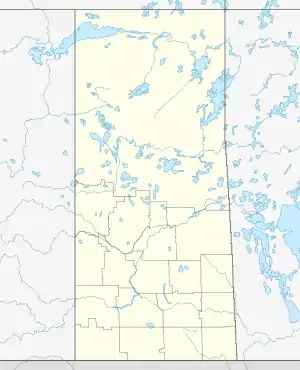RCAF Station Assiniboia
RCAF Station Assiniboia was a Second World War British Commonwealth Air Training Plan (BCATP) flying training station located near Assiniboia, Saskatchewan, Canada. It was operated and administered by the Royal Canadian Air Force (RCAF).
| RCAF Station Assiniboia | |||||||||||
|---|---|---|---|---|---|---|---|---|---|---|---|
| Near Congress, Saskatchewan in Canada | |||||||||||
 RCAF Station Assiniboia | |||||||||||
| Coordinates | 49°44′05″N 105°56′49″W | ||||||||||
| Site information | |||||||||||
| Operator | Royal Air Force (1942); Central Manitoba Flying Training School (1942-4); Royal Canadian Air Force(1944) | ||||||||||
| Site history | |||||||||||
| In use | 1942-4 | ||||||||||
| Garrison information | |||||||||||
| Occupants | No. 34 EFTS (1942-4);No. 25 EFTS (1944) | ||||||||||
| Airfield information | |||||||||||
| Identifiers | IATA: none, ICAO: none | ||||||||||
| Elevation | 2,370 ft (720 m) AMSL | ||||||||||
| |||||||||||
| Airfields | |||||||||||
RCAF Station Assiniboia | |
|---|---|
| Summary | |
| Owner/Operator | Royal Canadian Air Force |
| Location | Rural Municipality of Lake of the Rivers No. 72, near Assiniboia, Saskatchewan |
| Opened | February 11, 1942 |
| In use | 1942 - 1945[1] |
| Occupants | Royal Canadian Air Force/British Commonwealth Air Training Plan |
| Elevation AMSL | 2,370 ft / 722 m |
| Map | |
 RCAF Station Assiniboia Location in Saskatchewan  RCAF Station Assiniboia RCAF Station Assiniboia (Canada) | |
History
World War II
RCAF Station Assiniboia became the home station of the Royal Air Force's, No. 34 Elementary Flying Training School (No. 34 EFTS) on 11 Feb 1942. On 6 Jul 1942 the RAF turned over administration of the School to the Winnipeg Flying Club, operating as the Central Manitoba Flying Training School Ltd. who operated the school until No 34 EFTS was redesignated No. 25 EFTS on 30 January 1944. No. 25 EFTS was operated by the RCAF until it was disbanded on 28 July 1944.[2][1]
No. 34 EFTS trained pilots using the Cornell aircraft.[3]
No. 25 EFTS used the Fairchild Cornell as their training aircraft.[3]
On 2 Dec 1944 No. 204 Reserve Equipment Maintenance Satellite(REMS) was established at the station. Other units located at Assiniboia until the end of the war in 1945 include No. 41 Pre-Aircrew Training School, and No. 403 Aircraft Holding Unit.[2]
During World War II RCAF Station Assiniboia produced 2,496 pilots, the majority belonging to the RAF. The station also had a relief (emergency) landing field, located near Lethburn, Saskatchewan.
Aerodrome information
In approximately 1942 the aerodrome was listed as RCAF Aerodrome - Assiniboia, Saskatchewan at 49°44′N 105°57′W with a variation of 18 degrees east and elevation of 2,370 ft (720 m). Three runways were listed as follows: [4]
| Runway Name | Length | Width | Surface |
|---|---|---|---|
| 1/19 | 2,900 ft (880 m) | 150 ft (46 m) | Hard surfaced |
| 13/31 | 2,850 ft (870 m) | 150 ft (46 m) | Hard surfaced |
| 7/25 | 2,900 ft (880 m) | 150 ft (46 m) | Hard surfaced |
Relief landing field – Lethburn
A relief Landing field for RCAF Station Assiniboia was located approximately 6 mi (9.7 km) south. The site was located east of the town of Assiniboia, Saskatchewan. In approximately 1942 the aerodrome was listed as RCAF Aerodrome - Lethburn, Saskatchewan at 49°38′N 105°55′W with a variation of 18 degrees east and elevation of 2,350 ft (720 m).[5] The relief field was a square, turf, all way field measuring 2,640 ft (800 m) x 2,640 ft (800 m). A review of Google Maps satellite imagery on 7 June 2018 shows no details indicating a airfield at the listed coordinates.
Present day
The aerodrome is now the Assiniboia Airport.
References
Elmer, Gordon (Dec 2016). "75 years ago in Saskatchewan". Windsock. Vol. 29 no. 4. Regina, SK, Canada: Roland Groome (Regina) Chapter -- Canadian Aviation Historical Society.
- Hatch, F. J. (1983). The Aerodrome of Democracy: Canada and the British Commonwealth Air Training Plan, 1939-1945. Ottawa: Directorate of History, Department of National Defence. ISBN 0660114437.
- Bruce Forsythe's Military History Page (n.d.). "No. 34 Elementary Flying Training School / No. 25 Elementary Flying Training School". Retrieved 2009-11-03.
- Flight Ontario Freeware Scenery Designers (n.d.). "BCATP Schools - Assiniboia". Archived from the original on 2011-03-12. Retrieved 2009-11-03.
- Staff writer (c. 1942). Pilots Handbook of Aerodromes and Seaplane Bases Vol. 2. Royal Canadian Air Force. p. 30.
- Staff writer (c. 1942). Pilots Handbook of Aerodromes and Seaplane Bases Vol. 2. Royal Canadian Air Force. p. 47.